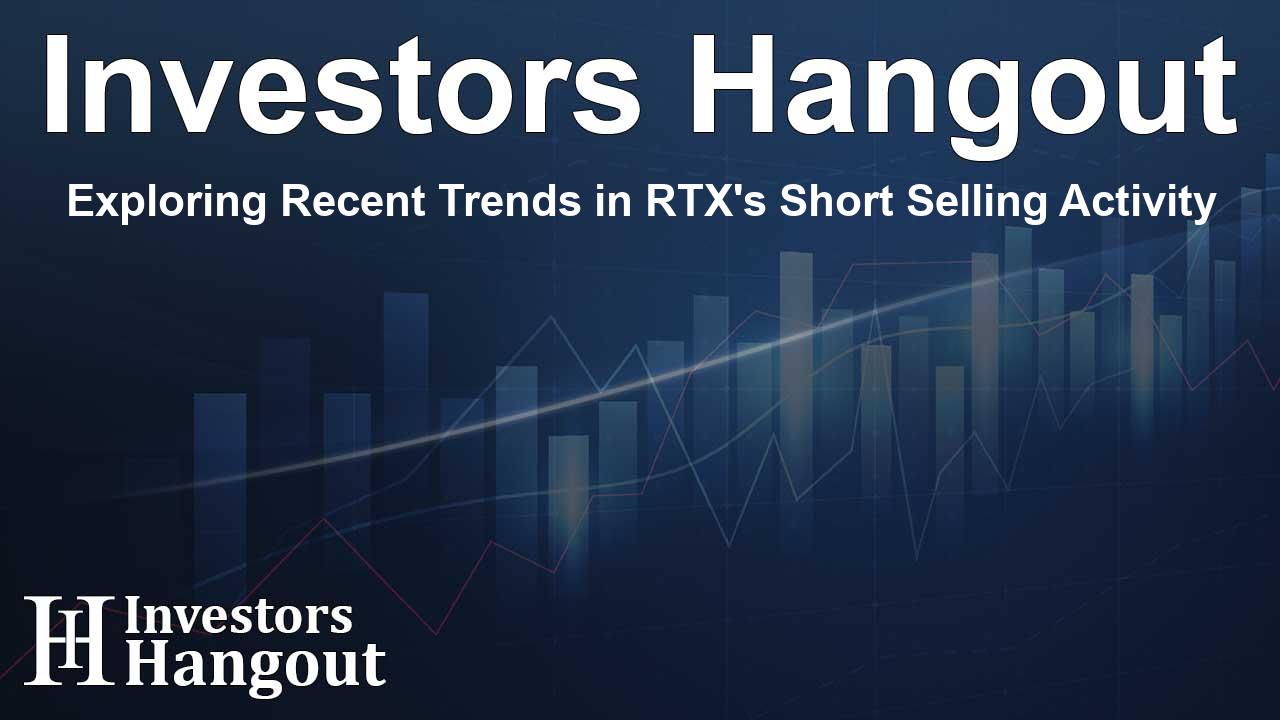Exploring Recent Trends in RTX's Short Selling Activity

Understanding RTX's Recent Short Interest Trends
Recently, RTX has shown a notable 8.65% decrease in its short percent of float. Currently, the company has reported a total of 12.58 million shares sold short, which accounts for 0.95% of all its available trading shares. Traders should take note that based on current trading volumes, it would average around 2.7 days for them to cover their short positions.
Importance of Tracking Short Interest
Short interest reflects the total number of shares that have been sold short without being covered. Short selling, in essence, is a strategy employed by traders who sell borrowed shares expecting the price to decline. If the stock price does fall, they can buy back the shares at a lower price, thereby making a profit, while a rise in stock price results in a loss for those traders.
Monitoring short interest is crucial for investors as it serves as a gauge of market sentiment. Increased short interest generally signals investor bearishness, whereas a decrease can indicate a shift towards bullish sentiment.
Current Trends in RTX’s Short Interest
The recent trend showing a decline in the percentage of shares sold short doesn’t necessarily predict that RTX's stock will rise in the immediate future. However, the reduction indicates that investors are less inclined to bet against the stock.
Comparative Analysis of RTX Against Industry Peers
Analyzing RTX’s statistics alongside its industry peers provides a clearer picture of its market standing. Peer companies, which share similar traits in terms of industry, size, and financial structure, can greatly influence the expectations of RTX's performance. Current data indicates that RTX's peer group has an average short interest percentage of 2.91%, suggesting that RTX is performing well by having lower short interest compared to its competitors.
Interestingly, a rise in short interest may at times be interpreted as a bullish signal for a stock. Increased short interest could suggest that traders believe the stock is going to face upward pressure, resulting from limited availability of shares to buy back when prices rise.
Conclusion on RTX’s Short Selling Activity
The current landscape surrounding RTX's short interest demonstrates a shift towards a more optimistic sentiment. Investors and traders alike should continue monitoring these changes to adapt their strategies appropriately.
Frequently Asked Questions
What is short interest?
Short interest refers to the number of shares that have been sold short but have not yet been closed out or covered by the sellers.
Why is short interest important to investors?
Tracking short interest gives investors insight into market sentiment regarding a particular stock, helping to inform their trading decisions.
How has RTX's short interest changed recently?
RTX's short interest has decreased by 8.65%, indicating reduced bearish sentiment among investors.
How does RTX compare to its peers in the market?
RTX currently has lower short interest compared to its peers, with an average of 2.91% for its industry group.
Can increased short interest be a positive sign?
Yes, in some cases, increasing short interest may signal bullish trends if investors expect the stock price to rise.
About Investors Hangout
Investors Hangout is a leading online stock forum for financial discussion and learning, offering a wide range of free tools and resources. It draws in traders of all levels, who exchange market knowledge, investigate trading tactics, and keep an eye on industry developments in real time. Featuring financial articles, stock message boards, quotes, charts, company profiles, and live news updates. Through cooperative learning and a wealth of informational resources, it helps users from novices creating their first portfolios to experts honing their techniques. Join Investors Hangout today: https://investorshangout.com/
Disclaimer: The content of this article is solely for general informational purposes only; it does not represent legal, financial, or investment advice. Investors Hangout does not offer financial advice; the author is not a licensed financial advisor. Consult a qualified advisor before making any financial or investment decisions based on this article. The author's interpretation of publicly available data shapes the opinions presented here; as a result, they should not be taken as advice to purchase, sell, or hold any securities mentioned or any other investments. The author does not guarantee the accuracy, completeness, or timeliness of any material, providing it "as is." Information and market conditions may change; past performance is not indicative of future outcomes. If any of the material offered here is inaccurate, please contact us for corrections.